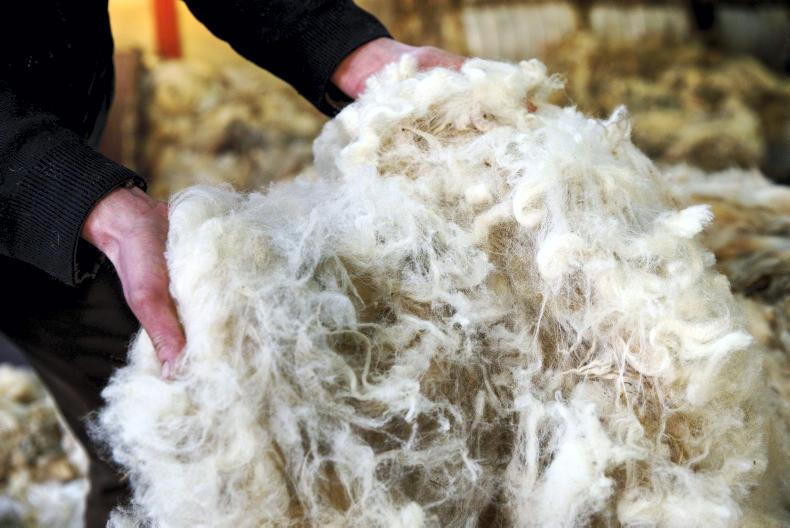The dismal state of wool markets is clear to see, with merchants now quoting for lowland and Scotch wool. The situation is particularly demoralising for hill sheep producers, with Scotch wool currently being quoted at a value of 5c/kg and leaving this year’s wool clip practically worthless. Farmers will receive as little as 10c/kg to 12c/kg for the value of a fleece from one ewe.
To put this in context, a typical 100 ewe flock would generate a sale value from wool of just €10 to €12.
This wool is trading from just 15c/kg to 20c/kg, with a typical fleece weighing 2.5kg generating a sale value of 38c to 50c/kg
A farmer would need to sell the wool of in the region of 1,000 sheep to generate a sale value of €100. It leaves a farmer who avails of a contractor to shear their sheep at an average cost of €2 to €2.50/head for a 100-ewe flock, subsidising the cost of shearing by €190 to €240.
It has led to some farmers opting to compost wool to retrieve its natural mineral content, while there are isolated reports of wool being dumped or attempts to burn it. The prospects for wool shorn from lowland sheep are only marginally better.
This wool is trading from just 15c/kg to 20c/kg, with a typical fleece weighing 2.5kg generating a sale value of 38c to 50c/kg. Taking the same shearing costs as above would leave a farmer with 100 ewes subsidising the wool cheque by €150 to €200 to cover costs.
Contrasting fortunes
While lamb prices have performed relatively well during the COVID-19 pandemic, it is a hugely contrasting story for the wool sector.
China dominates the global trade of wool, but the closure of large parts of its textile and wool processing industries has removed them from the market.
Unfortunately, cost continues to dominate and overrule ethical discussions regarding replacing products made with synthetic fibres with those made from natural fibres
This has also greatly hampered the British wool sector, with Chinese markets also accounting for a large percentage of wool sales, while further processing has been halted by the closure of scouring plants in Bradford.
Worldwide demand for woollen products is also being tempered by low oil prices, greatly reducing the cost of producing synthetic fibres. Unfortunately, cost continues to dominate and overrule ethical discussions regarding replacing products made with synthetic fibres with those made from natural fibres.
Storing wool
The market has performed poorly in recent years, as reflected in Figure 1, with prices running 25c/kg to 35c/kg behind 2019 levels, which was also a downbeat year for trading. Volatility has become a growing issue in the trade given China’s dominance and influence and this is demonstrated in Figure 2, which details wool trends as recorded by the Central Statistics Office (CSO).
Some long-standing merchants say it is the worst market dynamics they have ever witnessed. They state that while prices were often poor, at least there was an outlet with only miniscule volumes now trading.
Reports indicate that many farmers have opted in the short-term to store wool, in the hope of markets achieving some semblance of recovery. This is backed up by some merchants, who report that they are much quieter than normal for the time of year and as such are being presented with challenges in keeping their business operating at typical levels of throughput.
Only dry and clean wool should be packed for storage and wool packs should be stored in a dry shed that prevents the wool getting wet or damp
Where wool is being stored on-farm, merchants advise that the manner in which it is stored will have a marked effect on its quality. Only dry and clean wool should be packed for storage and wool packs should be stored in a dry shed that prevents the wool getting wet or damp. This can be achieved by storing wool packs on pallets raised off the floor, for example.
Merchants say they will continue to work with farmers through the challenging outlook and continue to take in wool until all storage space has been utilised, with some now not expecting to move any significant quantities of wool for a period of 12 to 18 months, or possibly longer.
British wool sales
The outlook in Britain is no better, with British Wool entering the season with some 9m kilos of wool on-hand, or one-third of their normal wool clip. As a result, the organisation recently announced that they will not be processing any payments in 2020. This includes any balancing payments due from the 2019 wool clip or advance payments for 2020’s wool clip.
Fine wool and lamb’s wool had the highest clearance of 76% and 77% respectively
The latest sale held by British Wool took place on 30 June. It achieved a clearance rate of just 51% of 1.629m kilos offered. Wool from hill breeds was a difficult trade, with 33% of mountain wool offered sold, 37% of wool classified as hill wool sold and 33% of wool from Mule ewes sold. Fine wool and lamb’s wool had the highest clearance of 76% and 77% respectively.
There was a similar clearance rate in the sale held on 16 June, but prices were easier, with clean wool reducing by 4p/kg, while the average price for greasy wool reduced 2p/kg to average 51p/kg. It should be noted that this is not the price received by the wool board, as prices are averaged over the season and a payment is made to producers after processing costs are deducted.
Despite funding being made available to other wool purchasers, British Wool has failed to qualify for support
To put the drop in the market in context, the price for greasy wool since the first sale of the season has reduced by 35p/kg, while the price of clean wool has worryingly fallen from £1.29/kg to 77p/kg. Meanwhile, a number of farm organisations have written to the British government asking them to reconsider their decision not to provide financial support to British Wool during the ongoing COVID-19 pandemic.
The Farmers Union of Wales deputy president Ian Rickman said: “Despite funding being made available to other wool purchasers, British Wool has failed to qualify for support, as they have been classified as a public sector body. British Wool is wholly independent, self-funding and operates within a competitive market place. We believe that British Wool should have fully qualified for support under the CBILs scheme, or some other variation of COVID-19 support for businesses”.








SHARING OPTIONS